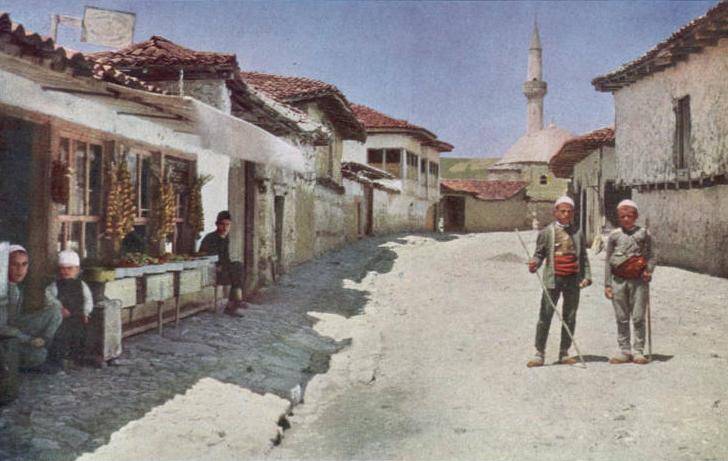
30 Figure 1.--This street sceen is Pristina was taken about 1930. Notuce boys with their white caps and perhaps school bags. Also notice the mosque and minasrets in the background. |

|
The Battle of Polje which decoided the fate of the Balkans for centuries was fought in Kosvo (1389). Serbs regarded Kosovo as part of the historic Serb lands. The independence of Serbia from the Ottomam Empire significantly undermined Ottoman control of the Balkans. Serbia gradually expanded as as early as the Russo-Turlkish War (1870s) began to expanbd into Kosovo. The opening of a Serbian seminary in Prizren (1871) began a period of expanding the Serb presence in Kosovo (1871). As aresult of the Nalkan Wars, Serbia had gained control of most Kosovo (1912). The poplation question is controversial. The Serbs claim a major presence in Kosovo. The Kosovars claim the Serbs are recent interlopers. While the population statistics are disputed, there is no question that Serbian nationalists had a strong emotional attachment to Kosovo.
Serbia including Kosovo after World War I merged with Montenegro--a small principaloty populated primarily with ethnc Serbs. The Serbs than united with the Slovenes, Croats to form the Kingdom of Serbs, Croats and Slovenes. The new kingdom included Macedonia. The Kingdom was renamed the Kingdom of Yugoslavia--meaning the kingdom of the southern Slavs. Ethnic tensions developed almost from the brginning in Yugoslavia because of the complex ethnic and religiousc compsition of the new state. The most intense rivalry was that between the Serbs and Croats, but there were other tensions as well. One of those was brtween the ethnic Albanians (modstly Muslim) and Serbs (mosdtly Orthodox Christians) in Kosovo.
Kosovo in Yugoslavia was an integral part of Serbia. Yugoslavia itself was dominated by the Serbs, yje largest ethnic group in the country. The population of Yugoslavia was about 12 million--most of who were Slavs. Only about 0.4 million were etnic Alnanians most of who lived in Kosovo. Yugoslav Census data reported that about 65 percent of the Kosovo population was ethnic Albanians, about 75 percent of shom were Muslim.
Incidents between Serbs and Albanians were at a very early point. Albanian Kosocars asked for League of Nation intervention ad union with neighboring Albania (1921). The Kosovars charged that Serb authorities had arrested
22,000 ethnic Albanians ince 1918. The League which was involved in a umber of such issues, many concerning Germany showed little interest in getting involved in another such dispute. A factor was that had been that the Serbs had been staunch allies to the Britisj and Frech who dominated the League.
The Kachak movement developed--a self defense force of armed Albanians seeking union with Albania. The Serbs began to see the Albanians as a disloyal national liberation movement.
Serb auhorities in the inter-War era promoted colonization efforts. The Gocernment appropriated land from ethnic Albanians and encouraged Albanians to emigrate. Most Albanians resisted. The Census of 1931 reported that the population was still 63 percent Albanian. Serbian policies were not having a major impact. Some question the Yugoslavs Census data, suspecying tampering by Serbian natiinalists. The Serbian colonization effort failed with the exception of some towns whhere the Serbian populstion increased. While the Serbian colonization effort failed, it created the heigtened tensions thast led to ethnic conflict during Wotld War II.
Navigate the Boys' Historical Clothing Web Site:
[Introduction]
[Activities]
[Biographies]
[Chronology]
[Clothing styles]
[Countries]
[Topics]
[Bibliographies]
[Contributions]
[FAQs]
[Glossaries]
[Images]
[Links]
[Registration]
[Tools]
[Boys' Clothing Home]
Navigate the Boys' Historical Clothing national pages:
[Return to the Main Yugoslav-Kosovo World War II page]
[Return to the Main Yugoslavs page]
[Return to the Main European country page]
[Return to the Main countries page]
[Australia]
[Belgium]
[Bulgaria]
[Croatia]
[England]
[France]
[Germany]
[Ireland]
[Italy]
[Japan]
[Korea]
[Mexico]
[Scotland]
[Spain]
[United States]
